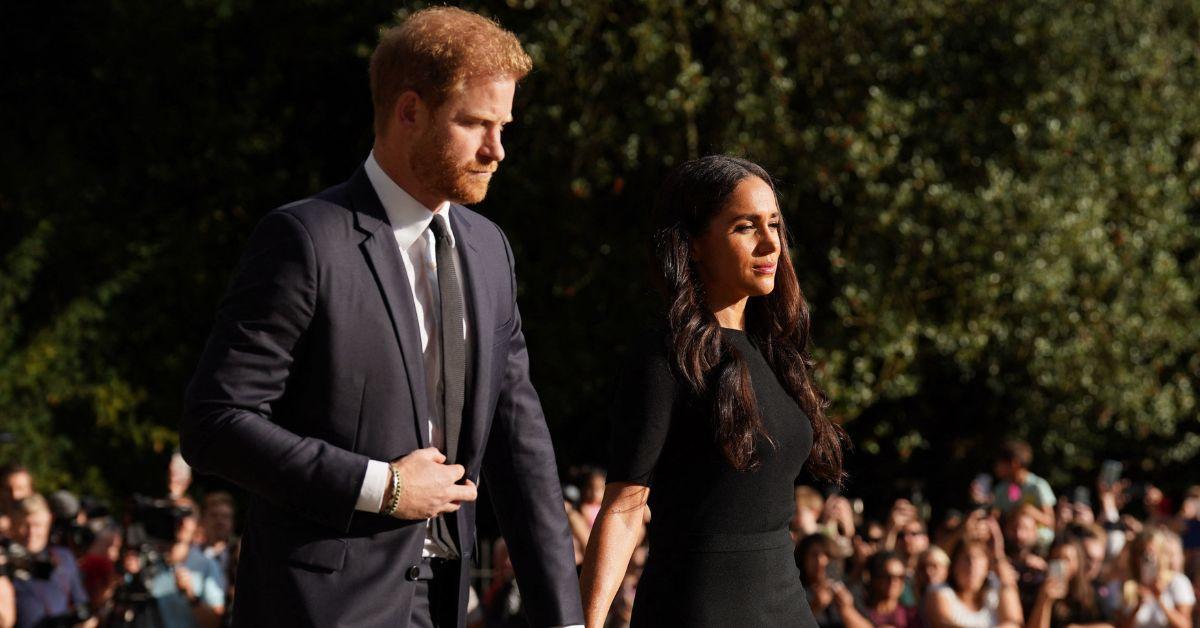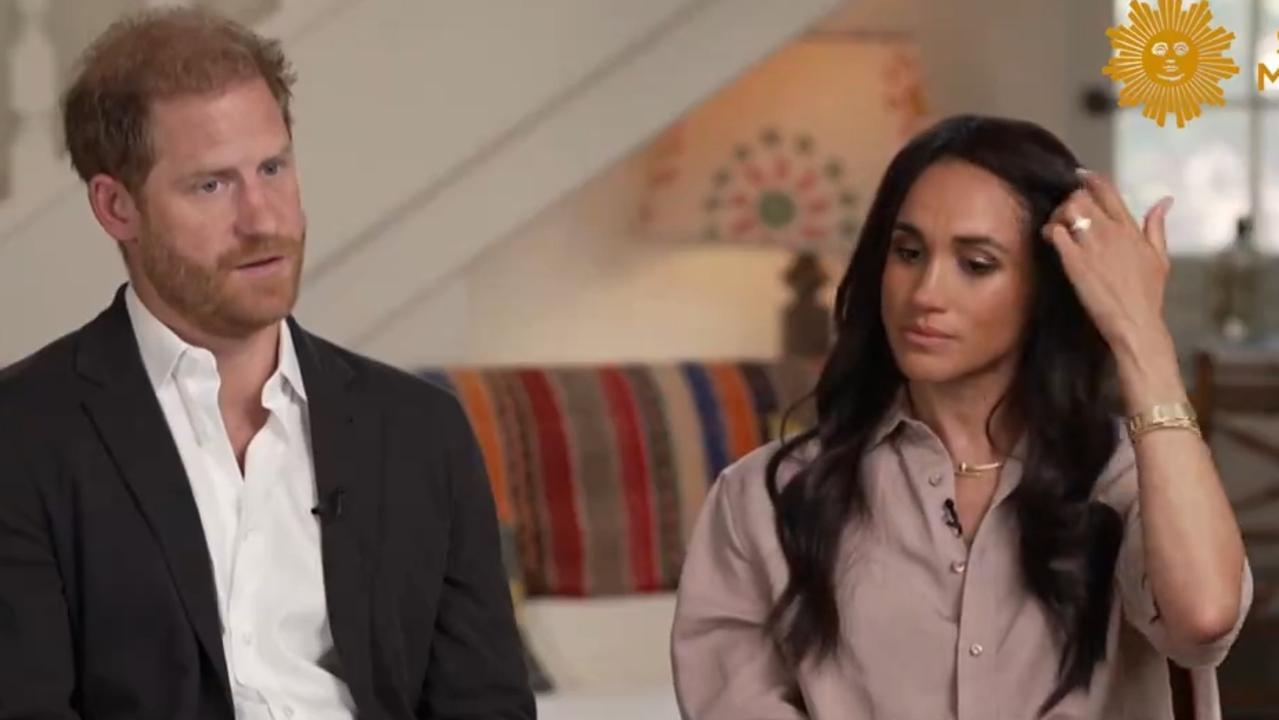Prince Harry’s wife, Meghan Markle, has long been the subject of intense media scrutiny, and in recent years, much of this coverage has taken on a distinctly negative edge. While the couple once appeared as bright new additions to the British Royal Family—winning praise for their modern style, global charitable ambitions, and candid approach—things took a downward turn as their relationship with the press soured. According to Prince Harry’s own accounts, this unrelenting scrutiny placed Meghan under enormous emotional strain, leading to moments of unimaginable distress.
In his candid memoir Spare, published in January 2023, Harry does not shy away from difficult topics. Among the most heartbreaking revelations in the book are passages describing Meghan’s profound pain over how she was being portrayed in the media. At one point, he recalls returning home to find Meghan in a state of utter despair. She was sobbing, overwhelmed by sadness and frustration. Her words—raw, vulnerable, and desperate—made it clear that the relentless negativity had chipped away at her sense of safety and self-worth.
Harry writes that, at first, he struggled to understand the full meaning of her distress. Meghan expressed that she “didn’t want to do this anymore,” and the gravity of those words took time to sink in. Initially confused, Harry soon realized the intensity of her emotions: this wasn’t about temporarily feeling low or discouraged; Meghan was grappling with the darkest thoughts one can have. In interviews they have given—both before and after Spare was published—Harry and Meghan have spoken of the toll that constant negativity took on her mental health. In a 2021 televised interview with Oprah Winfrey, Meghan herself admitted that the pressures of royal life and the onslaught of critical press coverage led her to contemplate suicide. She felt trapped and unheard, sensing that despite her pleas, the institution and the public conversation around her circumstances remained unchanged.
The heart of the matter, as Prince Harry describes it, lies in a painful question Meghan repeatedly asked: What had she done to deserve such treatment? From Meghan’s perspective, the hostility appeared grossly disproportionate. She had entered royal life hoping to serve the public, champion charitable causes, and represent the Crown in a positive, modern way. Yet, instead of encouragement or understanding, she often encountered suspicion and an unsettling kind of vitriol. Tabloid stories would paint her as difficult or demanding, and rumors, many unfounded, spread at a dizzying pace. The cumulative impact was devastating. Instead of being celebrated for her work or admired for her compassion, Meghan felt hated—or at least severely misunderstood—for reasons she could not fully comprehend.

Harry’s accounts confirm that these feelings went beyond frustration. Meghan’s anguish was not simply about negative press coverage; it was about a profound sense of isolation and a terror that she could not escape the turmoil. She worried about the pain this was causing not just herself, but also the people she loved. Harry writes of her concern for him and for her mother, Doria Ragland, who watched from afar as Meghan’s character was picked apart by outlets all over the world. The Duchess of Sussex, as Meghan was titled after her marriage to Harry, feared that the hostility and relentless judgment would bring despair to everyone in her circle.
Harry’s narrative in Spare contextualizes why the couple eventually stepped back from their roles as senior working royals in early 2020. While multiple factors influenced that decision—ranging from a desire for financial independence to the quest for a more private life—there can be no doubt that mental health played a crucial role. Harry and Meghan have repeatedly emphasized that protecting their well-being and that of their family, particularly as they welcomed their son Archie in 2019 and their daughter Lilibet in 2021, remained a top priority.

The media landscape surrounding Prince Harry and Meghan Markle did not improve overnight after their departure from the United Kingdom. Even after they resettled in California, headlines continued to swirl, dissecting every public appearance and analyzing every snippet of information for hidden meaning. Yet, by carving out more control over their lives, the couple has at least managed to distance themselves from the constant physical presence of paparazzi and the traditional royal press machinery. They have embraced a new chapter—one where they can speak openly, produce their own content, and choose their projects more freely.
The conversation about their relationship with the rest of the Royal Family continued, of course. The lead-up to King Charles III’s coronation became another flashpoint for speculation. In the months before the coronation took place on May 6, 2023, the media wondered aloud whether Harry and Meghan would attend. Invitations had been extended, that much was clear. But would they accept? Rumors and predictions circulated widely. Some reports focused on the strained dynamics between the Sussexes and the other royals, pointing out that Harry’s memoir had shed uncomfortable light on private family matters. Others noted that Meghan’s media treatment might have made a return to the royal spotlight fraught with difficulties.
:max_bytes(150000):strip_icc():focal(999x0:1001x2)/meghan-harry-netflix-121522-4-be961b56b6bf4dd9aa683276678191f8.jpg)
Ultimately, Harry attended the coronation alone. Meghan remained in California with their children. This decision was seen by many observers as a measured approach—Harry showed respect for his father’s historic moment, while Meghan avoided a media frenzy that might overshadow the solemnity of the event. The decision aligned with the couple’s careful approach to public appearances since stepping back from their official royal roles. While some speculators had tried to paint their attendance—or lack thereof—as a moment rich in drama and tension, the reality was that the couple made a choice they felt best supported their family’s well-being and minimized unnecessary conflict.
In the broader context, the question of “why” remains at the forefront. Why did Meghan Markle become a lightning rod for criticism and, at times, outright hatred from certain corners of the media and the public? The answers are complex and multifaceted. Some attribute it to longstanding class and racial biases; Meghan, as a biracial American actress entering a centuries-old British institution, represented change, and change often provokes fear and hostility. Others suggest that the aggressive pursuit of sensational stories by tabloids, eager to feed a constant 24/7 news cycle, contributed to exaggerated narratives and misinformation.
Yet, amid all this complexity, the human element stands out most starkly. At the center of these swirling controversies, intense speculation, and ceaseless debate stand two individuals who fell in love and attempted to build a life of meaning and purpose together. While critics may dismiss their grievances, and supporters may rally behind them, the emotional reality Harry described is hard to deny. He found his wife, tears streaming down her face, overwhelmed by sorrow, telling him that she didn’t want to go on living under these circumstances. If one puts aside titles, fame, and royal protocol, what remains is a human story about a woman feeling trapped, misunderstood, and attacked, and a man desperately trying to help her find a way forward.
These revelations have sparked broader conversations about mental health, the role of the media, and the responsibilities of public figures versus the responsibilities of those who report on them. Meghan’s experience highlights that the people gracing our headlines and newsfeeds are, in fact, human beings with vulnerabilities, emotional needs, and limits. When coverage becomes cruel or unrelenting, the psychological toll can be severe. Her story, as shared by Harry, is a testament to the importance of empathy and the pressing need for more respectful discourse in both traditional and digital media spaces.

In the aftermath of these events, Harry and Meghan continue to navigate a new life, one where they have more agency over their public image and more freedom to speak directly to their audiences. They have engaged with streaming services, written books, given interviews on their own terms, and spoken candidly about the values they hold dear. While tensions may still exist within the wider Royal Family, what is clear is that Harry and Meghan are determined to protect their mental well-being and that of their children.
In a world that often reduces public figures to caricatures, the depth of Meghan’s pain as described by Harry provides a sobering reminder that behind every headline, there is a heart—and sometimes that heart is breaking under the weight of words. By acknowledging this humanity, perhaps both the media and the public can strive towards greater understanding, compassion, and responsibility.


